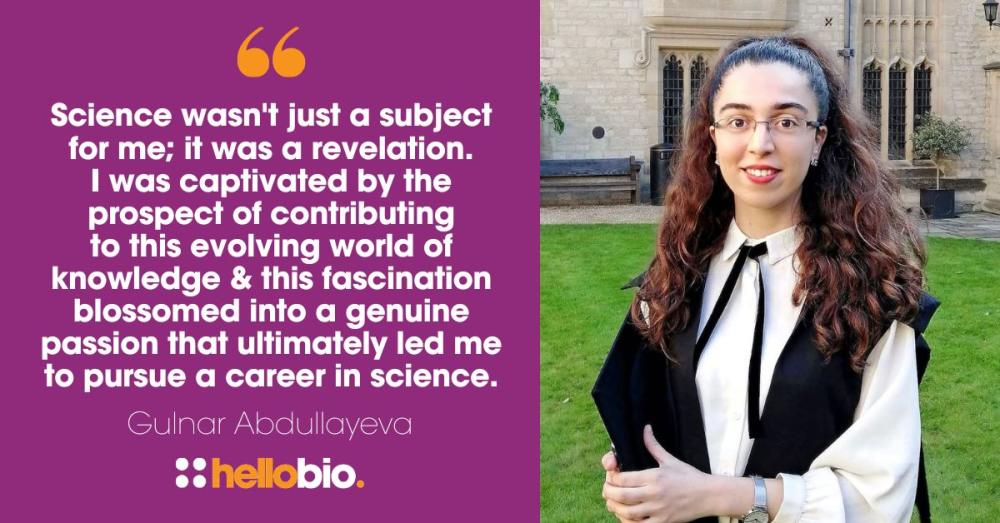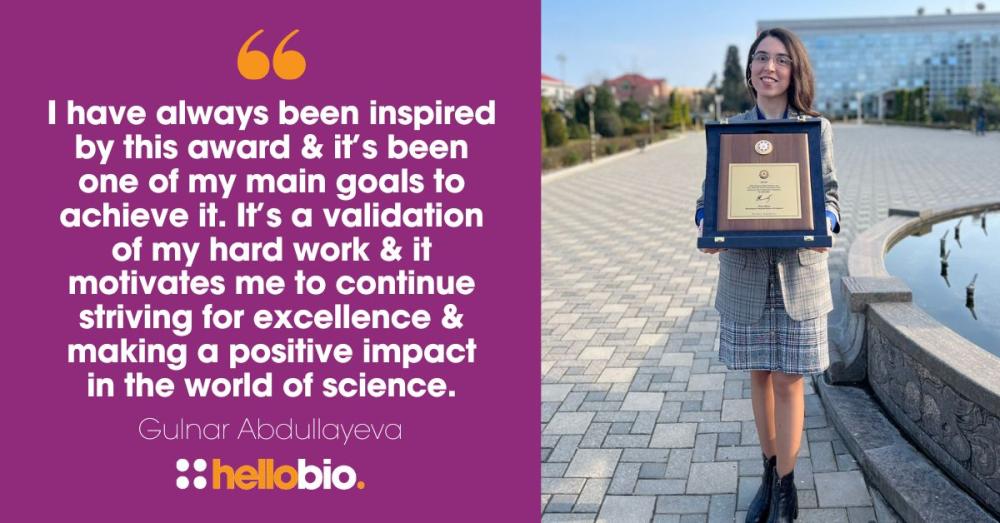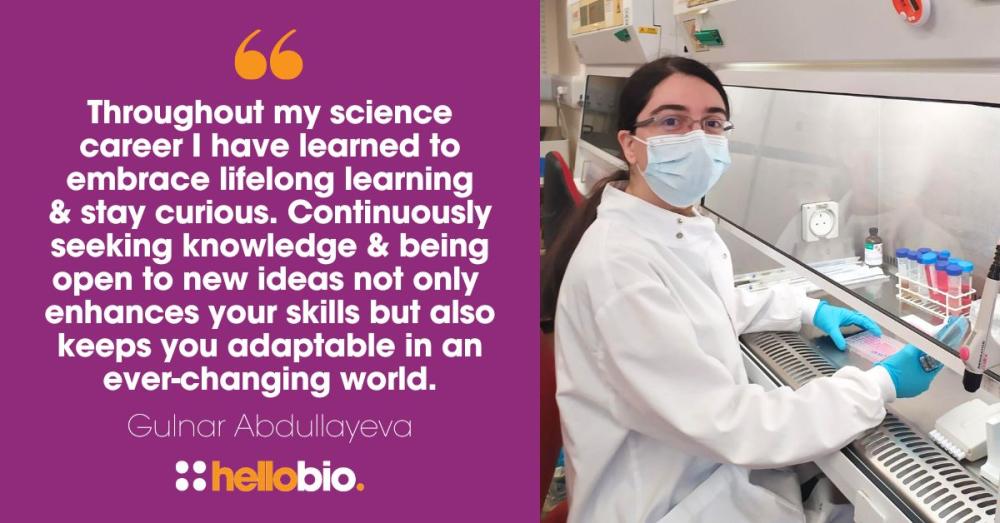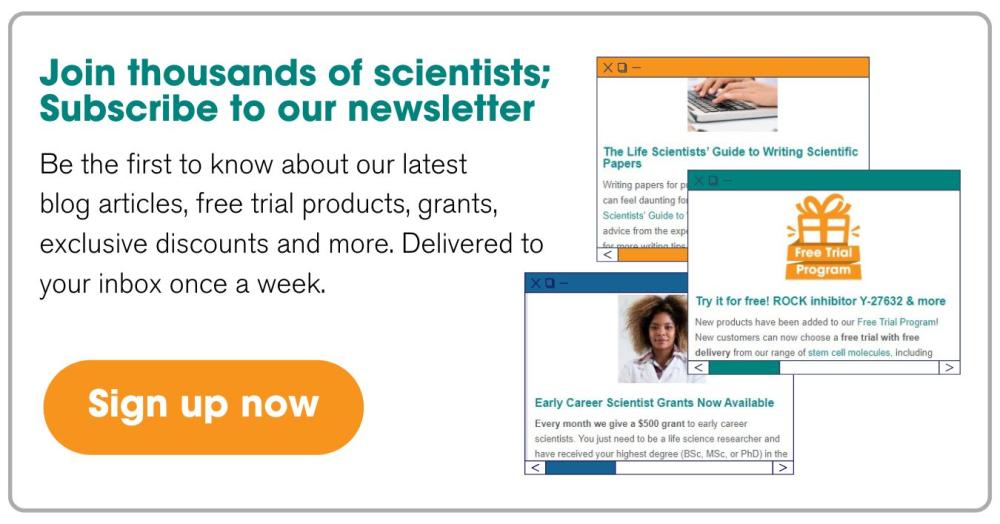Interviews with Scientists: Gulnar Abdullayeva
It’s time for another interview with a fascinating scientist! This week we chatted to Gulnar Abdullayeva of the University of Oxford, UK, who recently completed a DPhil in Oncology at the MRC Weatherall Institute of Molecular Medicine.
Earlier this year she was awarded an Azerbaijan Presidential Award for Youth for her distinction in the field of Science, and she was also the winner of last year’s Hello Bio Science Snapshots competition.
We were excited to find out more about the Presidential Award, as well as her current research work and her plans for the future! Read all about Gulnar in the latest installment of our ‘Interviews with Scientists’ series...
Hi Gulnar, please can you tell us a little bit about your current role at the University of Oxford?
I have recently completed my DPhil (PhD) in Oncology, at MRC Weatherall Institute of Molecular Medicine, University of Oxford. I work in the Cancer and Immunogenetics laboratory under the supervision of Professor Sir Walter Bodmer. I am currently affiliated as an Academic Visitor in the Department of Oncology and will soon begin my postdoctoral research in the Department of Paediatrics, University of Oxford.
What was the focus of your DPhil research?
My DPhil project focused on investigating goblet cell differentiation in colorectal cancer. The main objectives of my project were to uncover novel factors that may initiate cell differentiation and identify which primary defects – mutations or methylation – influence cell differentiation in colorectal cancer. This enhanced comprehension of cell differentiation offers potential advancements for the treatment of both mucinous and non-mucinous carcinoma.
Did you always want to work in science when you were younger, and if so why?
From a young age, curiosity has driven me to delve into the world around me. This inherent curiosity, which some might phrase as overthinking, naturally drew me towards the captivating world of science. As I dived deeper, science wasn't just a subject for me; it was a revelation, a whole world of its own. It offered a profound sense of logic and order. I was captivated by the prospect of contributing to this evolving world of knowledge, and this fascination blossomed into a genuine passion that ultimately led me to pursue a career in science.
What excites you most about the work that you do?
Oh! “Practical Laboratory Experiments” There's nothing quite like the thrill of hands-on experimentation in a lab. I could spend days lost in that world, fueled by the constant hum of discovery. It gives me the adrenaline rush and keeps me on my toes. That's what keeps me going!
You moved from Azerbaijan to the UK to pursue your scientific studies. What challenges did you face when starting work in a new country?
Leaving Azerbaijan and moving to the UK was the biggest step I have ever taken. While my scientific studies were a major focus, adjusting to working in the UK presented its own set of challenges. Firstly, having relocated from Azerbaijan, I was unfamiliar with the culture here. Secondly, there was the inevitable language barrier. While I had a good grasp of English, certain idioms and colloquialisms can be tricky to understand. As this was my first time away from my family, soon I got homesick. But thanks to the friendly nature of people in Oxford, with time I adjusted. I made new friends and started socialising.
You recently received a ‘Presidential Award for Youth’ from the President of Azerbaijan for your achievements in Science. Can you tell us a little more about the award?
“Presidential Awards for Youth” are given to individuals who have shown exceptional merit in areas including science, education, culture, youth policy, youth work, public and socially oriented activities, as well as innovations and entrepreneurship. I am incredibly honoured to receive this prestigious award.
What does it mean to you to receive such prestigious recognition?
Winning the “Presidential Award for Youth” means the world to me. Words cannot adequately express how honoured and appreciative I am to have been chosen for this award. I have always been inspired by this award and it has been one of my main goals to achieve it. This award is a constant reminder that I have made my parents, teachers, and country proud, and is a true validation of my hard work. It motivates me to continue striving for excellence and making a positive impact in the world of science.
I express my sincerest gratitude to His Excellency Mr. Ilham Aliyev, the President of the Republic of Azerbaijan for his attention, care, support, and trust. I am very grateful to the Islamic Development Bank, Azerbaijan National Academy of Sciences, Institute of Molecular Biology and Biotechnologies, Ministry of Science and Education of the Republic, St Cross College, and the Department of Oncology at the University of Oxford for their tremendous support during my academic journey. I would like to extend my thanks to my supervisors, Professor Sir Walter Bodmer and Academician Professor Irada Huseynova for their dedication, expertise and invaluable guidance. I am deeply thankful to my family, as well as all my teachers and mentors, whose guidance and support have greatly influenced my academic achievements and overall welfare.
What do you think are the biggest challenges facing science students today?
One significant challenge facing science students today is the rapid evolution of technology in the landscape of scientific research and education. Keeping up with the latest developments can be overwhelming, requiring students to consistently update their knowledge and skills. In addition, the demand to publish research and obtain funding creates a competitive atmosphere that could potentially overshadow the curiosity and creativity vital for scientific investigation. Maintaining a balance between professional commitments and personal life is pivotal for achieving academic excellence and the well-being of scientists.
Who has been your greatest role model in science, and why?
I owe all my achievements to my family, teachers, and mentors, and I am forever grateful to them. I feel incredibly fortunate to have them in my life, constantly inspiring me to improve and become a better version of myself every day.
Marie Curie has been my greatest role model in science. Her ground-breaking work in radioactivity not only advanced our understanding of the atom but also paved the way for significant developments in fields like medicine and physics. Her unwavering determination, innovative approach, and commitment are a source of inspiration for scientists across generations.
What's the most valuable piece of advice you’ve been given in your career so far?
The most valuable piece of advice I was given was that No matter the situation, always remember and follow these three words: “Persistence, Patience, and Perseverance.” Throughout my science career, I have learned to embrace lifelong learning and stay curious. Continuously seeking knowledge and being open to new ideas not only enhances your skills but also keeps you adaptable in an ever-changing world.
How do you see your career progressing in the future/where do you see yourself in 10 years?
I'm a firm believer in setting ambitious goals, and one of my long-term aspirations is to be recognized for my scientific contributions – to win the Nobel Prize someday. It may seem like a bit much, but it's an achievement to look forward to, right? My main dream is to contribute to science and make valuable improvements in this world. Hence in the future, I see myself as a successful scientist contributing to the world of science.
Outside of your career, what do you enjoy doing most?
Oh, I cannot tell you how much I love travelling. Additionally, I enjoy swimming, crocheting, and running. I find these hobbies to be detoxicating for my body and mind.
What do you think is the greatest scientific discovery of all time?
It is tough to pick just one, but I would say the discovery of DNA, CRISPR-Cas9 gene editing technology, penicillin, and vaccines ranks among the greatest. Their invention revolutionized medicine, saved countless lives, unlocked the secrets of inheritance, and paved the way for numerous advancements in genetics, medicine, and biotechnology.
And finally… what’s your favourite science quote?
“The most important thing is to never stop questioning.” — Albert Einstein
________________________________
Thanks for such a great interview Gulnar! Congratulations again on your Presidential Award, and we look forward to following your career as it progresses!
Connect with Gulnar:
- LinkedIn: Gulnar Abdullayeva
________________________________
If you enjoyed this article, why not check out the other resources available on our blog. We are passionate about supporting life scientists including early career life scientists and PhD students - with really low-priced reagents, antibodies and biochemicals, early career scientist grants, and resources to help with both personal and professional development. We know how tough it is - so we hope you find these helpful!
More General Support for Life Scientists
For advice on wellbeing, dissertations, presenting at conferences, wellbeing, PhD support, networking and lots more, we have a huge range of articles to help - just click below:
Save up to 50% on our high purity reagents...
When you get to the stage of planning your experiments, don't forget that we offer a range of low-cost, high-purity agonists, antagonists, inhibitors, activators, antibodies and fluorescent tools (yes - they really are around half the price of other suppliers!) You can use our Quick Multi-Search Tool to search for lots of products in one go, and the range includes:
- Enzyme inhibitors and activators
- Chemogenetic ligands
- Ion channel modulators
- GPCR & ionotropic receptor ligands
- Cell biology reagents & biochemicals
Technical resources
Try our Molarity Calculator: a quick and easy way to calculate the mass, volume or concentration required for making a solution.
Try our Dilution Calculator: an easy way to work out how to dilute stock solutions of known concentrations
We also offer a comprehensive range of technical resources including antibody protocols and methods, product guides and mini-reviews:
And finally, don't forget to check back in with our blog regularly for our latest articles. If there’s something you’d love to contribute to the community, whether that’s an interview or article, drop us a line at hello@hellobio.com
---

























